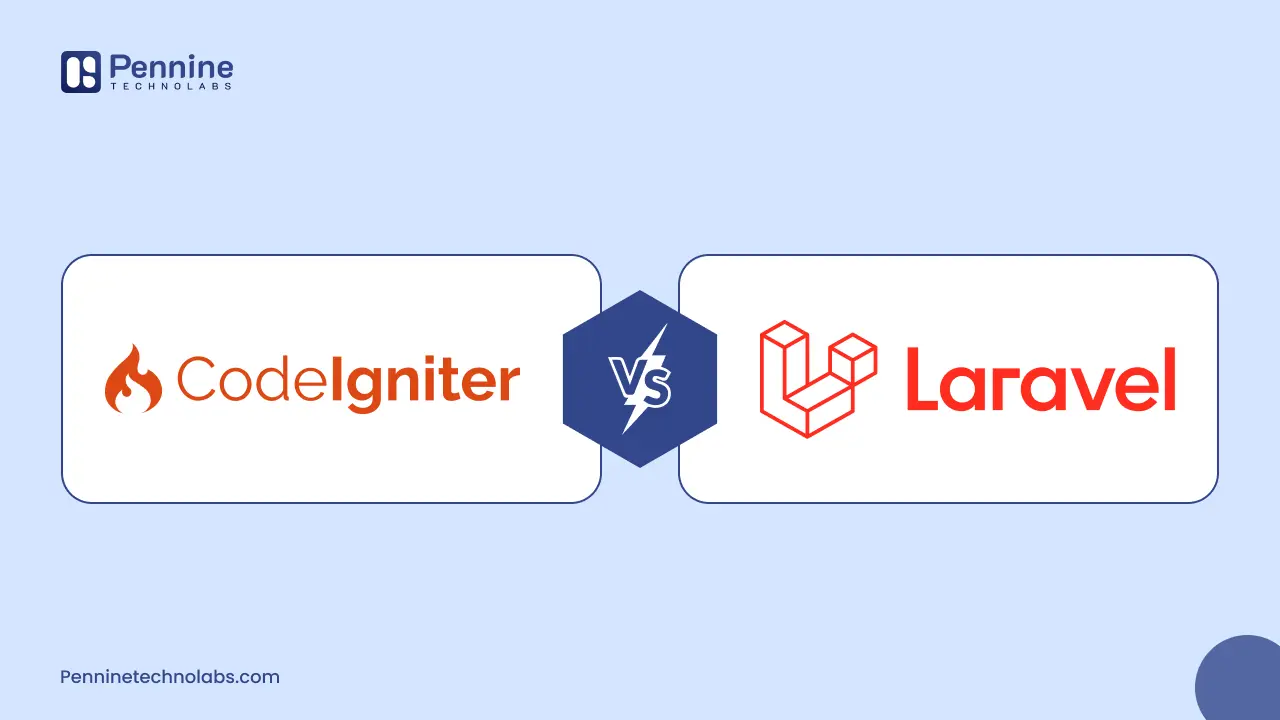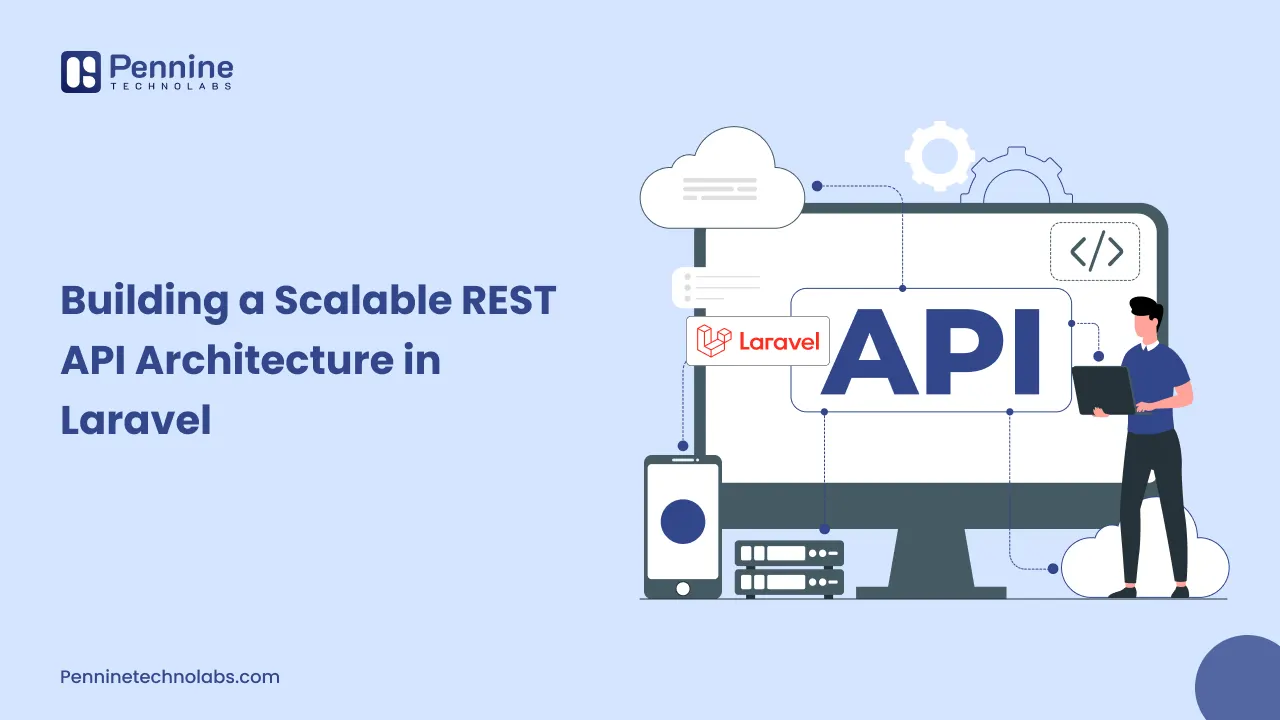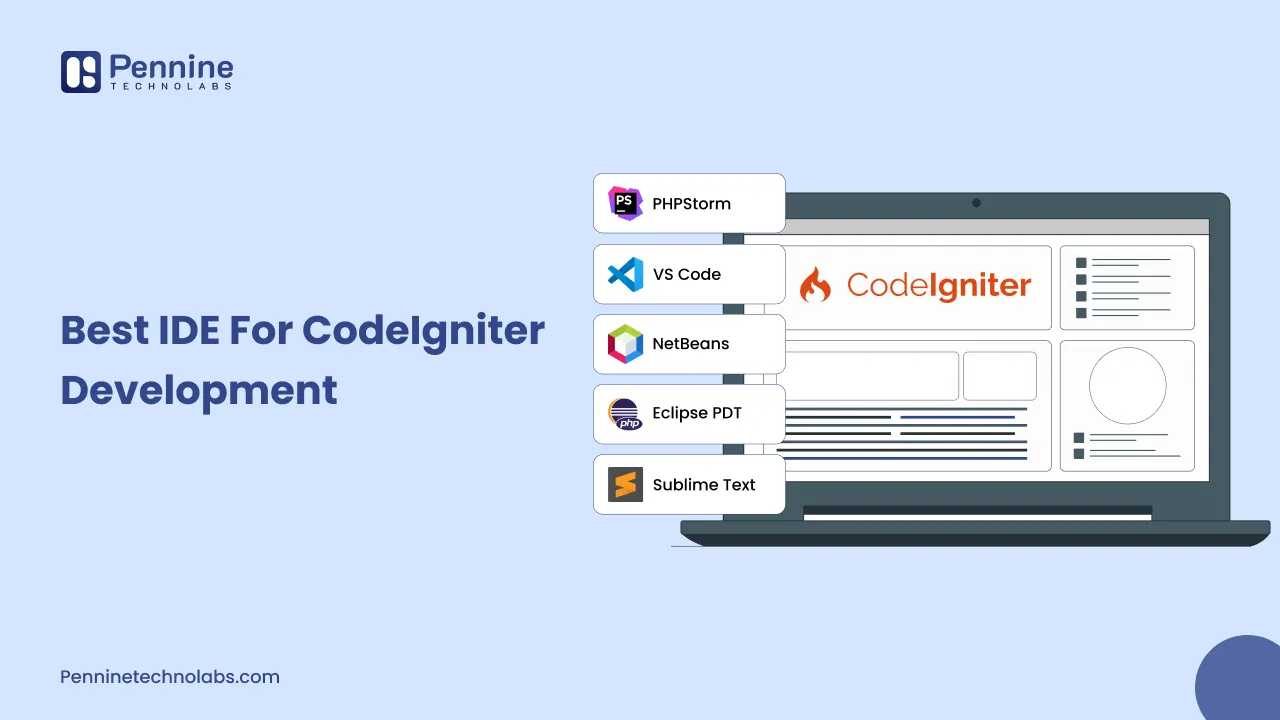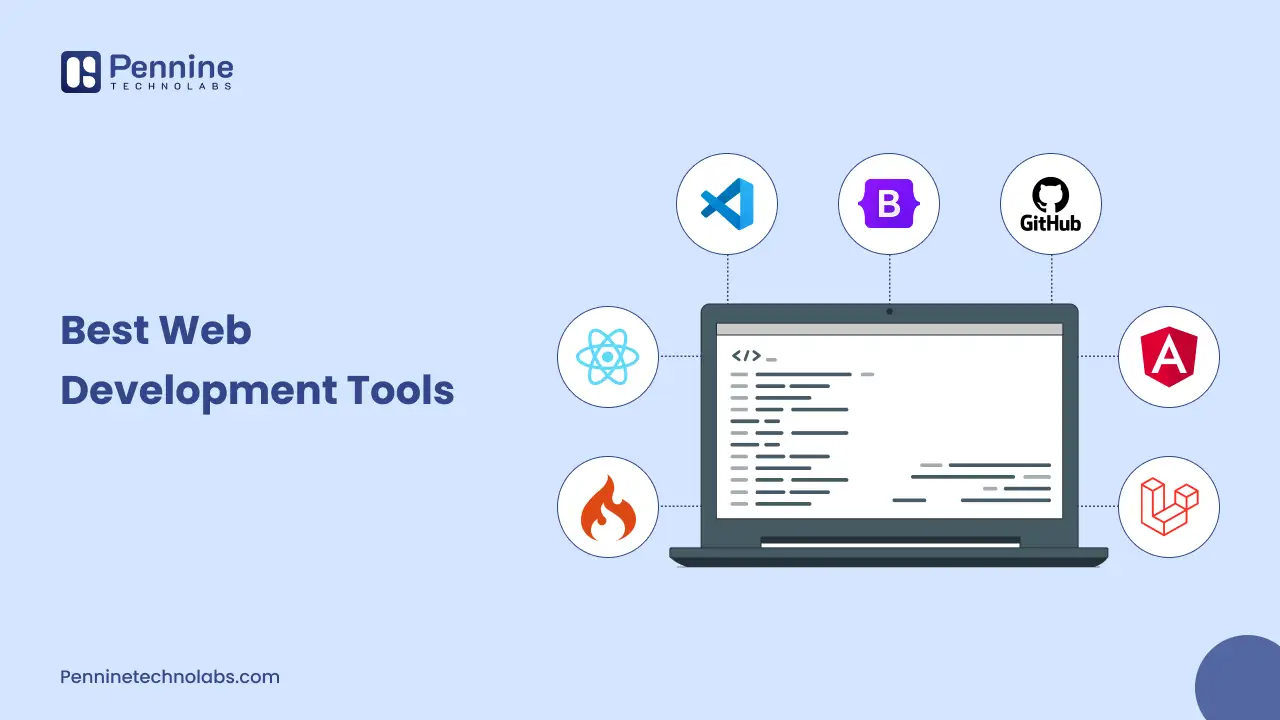Quick Summary: Laravel and CodeIgniter are two popular frameworks with their own strengths. Laravel is perfect for enterprise-grade applications, while CodeIgniter offers speed and simplicity. We have provided a detailed explanation of the use case and comparison between Codeigniter and Laravel. With a guided article, you will get a better understanding of which framework to choose.
PHP is among the popular languages in building web applications, being used in more than 75% of websites on the internet. The PHP language has evolved significantly over time, and so have its frameworks, which aim to simplify development, enhance performance, and reduce coding.
Two of the most popular PHP frameworks are Laravel and CodeIgniter, among dozens of others. They are both open-source, are based on the MVC architecture, and both have strong communities. But they are not identical. The success of your project, as well as its scalability, maintainability, and long-term viability, depends on the right choice.
A PHP development company offers Laravel and CodeIgniter backend frameworks and tech stacks, helping you choose the one that aligns with your business and technical goals.
What is the Laravel Framework?
Laravel is a fresh PHP framework designed with elegance and scalability. Taylor Otwell created Laravel in 2011 to overcome the shortcomings of older PHP frameworks, such as CodeIgniter, mainly with built-in authentication and routing. The Laravel framework has become among the most popular PHP frameworks due to its clean syntax and extensive ecosystem.
Laravel is also reputed to assist web developers in developing applications within the shortest time possible, without compromising the quality of the code. It has routing, caching, authentication, database migrations, and API building tools. A Laravel development company offers a powerful platform for developing small to enterprise-level web applications.
Best Features of Laravel PHP Framework
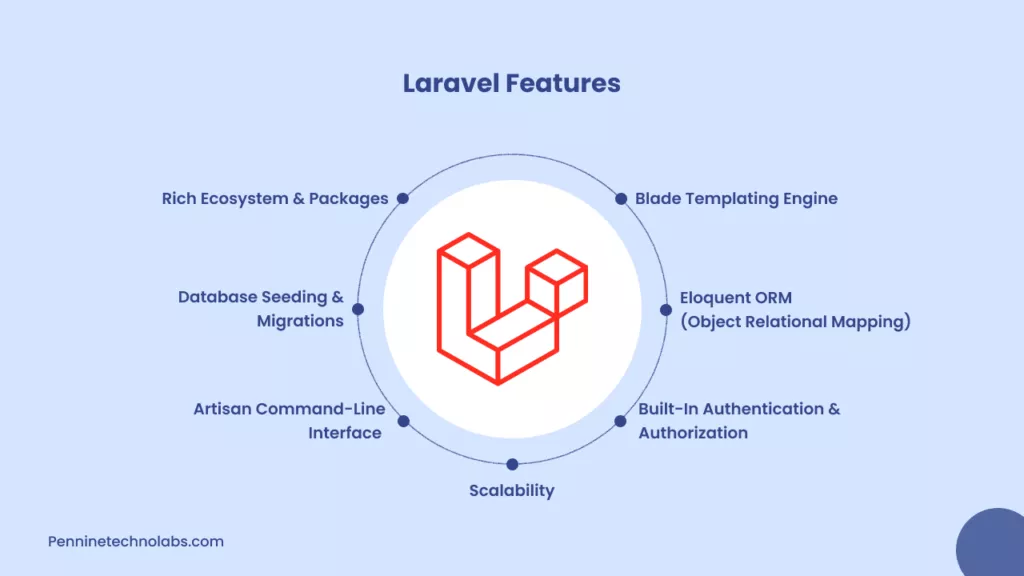
Laravel’s Model-View-Controller (MVC) framework assists in structuring better code by separating the business logic (model), the user interface (view), and the application logic (controller). This results in cleaner, maintainable, and testable code, especially with large teams and long-term projects.
- Blade Templating Engine
Blade is a small templating engine in Laravel that allows you to write dynamic and reusable layouts without enormous overhead. It enables the direct insertion of PHP code into views and provides template support, simplifying and streamlining front-end development.
- Eloquent ORM (Object Relational Mapping)
One of the best features of Laravel is Eloquent ORM. It eases database tasks by enabling Laravel developers to manipulate database tables as objects. For instance, simple syntax enables easy record retrieval and makes code easier to read and maintain.
- Built-in Authentication and Authorization
Laravel comes with an integrated authentication system that includes login, registration, password reset, and role-based access control by default. This also saves time spent on manually developing such features and enhances security.
- Artisan Command-Line Interface
Artisan is a command-line tool that helps developers run routine actions such as database migrations, seeding, clearing the cache, running tests, and producing boilerplate code. This accelerates development and reduces human error.
- Database Seeding and Migrations.
Laravel allows version control of the database structure using migrations. In conjunction with seeding, it provides a speedy way to populate databases with dummy data for testing and development.
- Rich Ecosystem and Packages
Laravel provides a comprehensive ecosystem consisting of various tools, including Laravel Horizon for queue monitoring, Laravel Echo for responding to real-time events, Laravel Passport for API authentication, and Laravel Nova for admin dashboards.
- Scalability
Laravel is compatible with microservices and can be deployed on clouds, such as AWS, Azure, and Google Cloud. The Laravel framework can support heavy traffic loads with the help of caching systems such as Redis and database load balancing.
A Laravel development company ensures that all the projects gain access to Laravel’s ecosystem. If you are planning an enterprise-level project, hire Laravel developer to build web applications that are secure, scalable, and future-ready.
Also Read: Best Features of Laravel PHP Framework
What is CodeIgniter Framework?
Codeigniter is one of the oldest PHP frameworks, known for being sharp, simple, and lightweight. Codeigniter is a light web application toolkit created by EllisLab in 2006, designed to help website developers quickly create dynamic websites. Being simple to install is an advantage and is popular among developers who prefer as many configuration options as possible.
CodeIgniter remains popular among startups and companies that need to complete projects quickly without an extensive learning curve. CodeIgniter development company offers developers flexibility with a few restrictions, making it an attractive option for small teams or projects with strict budget constraints.
Main CodeIgniter Features for Web Development

- High Performance and Ultra-Lightweight
CodeIgniter has a minimal core footprint that leads to better execution time. This is why it is commonly used in areas with a high performance preference.
- Simple installation and Configuration.
CodeIgniter is straightforward to set up and requires minimal server setup. Just download, install, and start developing in a few minutes, avoiding any complicated setups.
- Flexible MVC Implementation
CodeIgniter framework supports MVC. This provides developers with the freedom to formulate their code. In smaller projects, this flexibility can lead to swift development.
- Security Features
CodeIgniter is supported by several security applications, including XSS filtering, CSRF protection, password hashing, and built-in input validation. These features minimize vulnerabilities and secure applications with minimal effort.
- Data Handling
CodeIgniter features an effective form validation library, which simplifies and secures user input. This comes in particularly handy when dealing with forms, logins, and user-generated content.
- Error Control and Debugging.
The structure provides comprehensive and simple error reporting, making it easier to identify and rectify problems at an earlier stage of the development process.
- Libraries and Helpers Extensibility.
CodeIgniter allows developers to utilize the required libraries, making web applications lightweight. Custom libraries and Helpers can expand their functionality to meet requirements.
- Database Support
CodeIgniter is database agnostic and has a basic query building system to run CRUD tasks without having to write complicated SQL.
A CodeIgniter website development company in the USA helps businesses leverage these key features. The goal is to build a quick MVP or a small business application that can save time and resources.
Hire a CodeIgniter developer for custom applications that are easy to maintain and offer a high-performance CodeIgniter website.
CodeIgniter vs Laravel: A Detailed Comparison
| Assets | Laravel Framework | CodeIgniter Framework |
|---|---|---|
| Architecture | Strict MVC with clear separation of concerns | Supports MVC, but flexible, can work without it |
| Learning Curve | Moderate to steep, requires understanding of modern PHP concepts | Very beginner-friendly and easy to learn |
| Performance | Slightly slower due to a feature-rich structure | Extremely fast due to its lightweight core |
| Templating Engine | Comes with Blade templating engine | No built-in templating engine |
| Database Handling | Eloquent ORM with advanced features | Query builder, no ORM but simple to use |
| REST API Support | Out-of-the-box support for RESTful API development | Needs manual configuration |
| Security | Strong security features, CSRF, and authentication built in | Good security features, but needs more manual setup |
| Community Support | Very large community, regular updates, active ecosystem | Smaller but loyal community with strong documentation |
| Best Use Case | Large-scale, enterprise-grade applications, SaaS platforms, complex APIs | Small-to-medium-sized projects, MVPs, applications needing quick delivery |
Similarities Between Laravel and CodeIgniter
With different philosophies and functionality, Laravel and CodeIgniter share many similarities:
- Both are open-source PHP frameworks.
- Both follow MVC architecture for structured development.
- Both databases support migration and verification.
- Both are known for their clear documentation and active communities.
- Both are suitable for scalable web applications.
Also Read: What is CodeIgniter? Is it Relevant in 2026
Which framework is better, CodeIgniter or Laravel?
The answer depends on the type of project you are building and your long-term objectives. Neither CodeIgniter nor Laravel is strictly “better” in every scenario, but one may be a better fit for your specific use case. Here’s a clear comparison to help you decide a better backend framework for your project:
When to Choose Laravel
Many business organizations partner with a Laravel development company for their ecosystem and rapid development deadlines. A dedicated larval developer offers ongoing support and long-term maintenance to your project. Laravel is the best option if:
- The project has complex business logic and many third-party integrations.
- You are developing an extensive application, such as a SaaS application or an ecommerce application.
- You want built-in certification, enhanced security, and a cutting-edge Tech stack.
- Applications will be overscale in the coming years.
When to Choose CodeIgniter
With trusted CodeIgniter development services, you get a fast, stable, and well-optimized product. Choose the CodeIgniter framework if:
- You require a fast-loading, lightweight application.
- You are creating a prototype or MVP to go to market fast.
- You want a basic framework with basic PHP features.
- You prefer flexibility and minimal configuration to enable quicker deployment.
Future and Long-Term Viability
Laravel is still regularly updated, and its ecosystem continues to support modern development trends such as microservices and API-first applications. It will continue to be the choice of enterprise-level projects.
CodeIgniter has also been developed with its newer versions to focus on performance and simplicity. Although its update cycle is slower than that of Laravel, it is also a good option to be considered by businesses that are focused on maintaining speed and reducing maintenance expenses.
Laravel offers businesses with a long-term focus more opportunities to innovate, thanks to its vast community and rich feature set. Nevertheless, CodeIgniter remains a low-cost solution when used in lightweight projects due to its minimalistic nature.
Conclusion
Laravel and CodeIgniter are both great options; however, the best choice to use depends on the complexity, budget size, and long-term objectives of your project. Laravel is ideal when a scalable, enterprise-ready, and feature-rich application is required. CodeIgniter is best suited for smaller applications that require speed, simplicity, and flexibility.
Pennine Technolabs is an experienced Laravel development company and CodeIgniter website development company in USA, helping businesses choose the proper framework as per their business requirements. We offer tailored solutions that help build fast, secure, and scalable applications.
Pennine Technolabs is an experienced Laravel development company and CodeIgniter website development company in USA, helping businesses choose the appropriate framework according to their business requirements. We offer a custom solution that helps in building fast, safe, and scalable applications.
FAQs on CodeIgniter vs Laravel
Which is the fastest small project, Laravel or CodeIgniter?
CodeIgniter is also more lightweight and suitable for smaller applications due to its lightweight architecture.
Is Laravel more suitable for complex web applications?
Yes, Laravel is perfect for complex projects that require multiple integrations and scalability over an extended duration.
Can I migrate from CodeIgniter to Laravel later?
Yes, Migration can happen, but it will entail a few rewrites to the application.
What is easier to learn for new developers?
CodeIgniter is simpler due to its minimal configuration and well-documented nature.
Which framework has superior community support?
Laravel boasts a more extensive and active community, whereas CodeIgniter has its own widely recognized documentation due to its simplicity.
